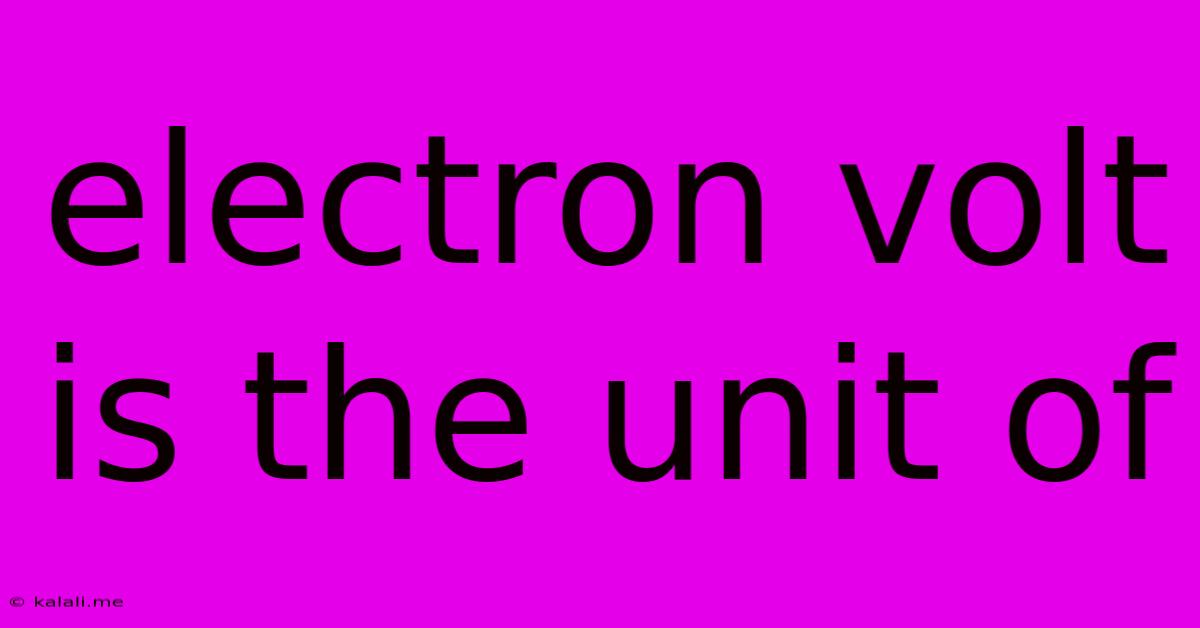Electron Volt Is The Unit Of
Kalali
Jun 15, 2025 · 3 min read

Table of Contents
Electron Volt: The Unit of Energy at the Atomic Scale
The electron volt (eV) is a unit of energy, commonly used in atomic physics, nuclear physics, and particle physics. It's crucial for understanding the interactions of subatomic particles and the energy levels within atoms. This article will delve into what exactly an electron volt is, how it's defined, and why it's such a vital unit in these scientific fields.
What is an Electron Volt?
An electron volt is defined as the amount of kinetic energy gained by a single electron when it accelerates through an electric potential difference of one volt. In simpler terms, imagine an electron moving across a battery. The energy it gains as it travels from the negative terminal to the positive terminal is one electron volt. This might seem like a tiny amount of energy, and it is on a macroscopic scale. However, at the atomic and subatomic level, it's a significant measure of energy.
Defining the Electron Volt:
The electron volt is derived from fundamental physical constants: the elementary charge (e) and the volt (V). Mathematically, it's expressed as:
1 eV = 1 e × 1 V
Where:
- e is the elementary charge, approximately 1.602 × 10⁻¹⁹ coulombs.
- V is the volt, the SI unit of electric potential.
This calculation ultimately results in 1 eV being equal to 1.602 × 10⁻¹⁹ joules (J), the standard SI unit of energy. While joules are perfectly acceptable, using electron volts provides a more practical and intuitive scale for the energy levels involved in atomic and subatomic processes.
Why Use Electron Volts?
The electron volt's practicality stems from its direct relationship to the energy changes within atoms and molecules. For example:
- Ionization energies: The energy required to remove an electron from an atom is often expressed in electron volts.
- Bond energies: The energy required to break a chemical bond can also be conveniently measured in electron volts.
- Particle physics: In particle accelerators, the kinetic energy of accelerated particles is typically measured in electron volts, often expressed in multiples like kiloelectron volts (keV), megaelectron volts (MeV), gigaelectron volts (GeV), and even teraelectron volts (TeV) for extremely high-energy particles.
- Nuclear reactions: The energy released or absorbed in nuclear reactions is frequently described using electron volts.
Electron Volt and Other Units:
It's important to understand the relationship between electron volts and other energy units. As mentioned, 1 eV = 1.602 × 10⁻¹⁹ J. This allows for conversions between electron volts and joules, enabling scientists to utilize both systems depending on the context. The use of electron volts simplifies calculations and provides a more manageable scale when dealing with the minute energies involved in subatomic interactions. Using joules directly would involve cumbersome scientific notation in many instances.
In Conclusion:
The electron volt, while seemingly a small unit of energy in the macroscopic world, is an essential tool for physicists and chemists working at the atomic and subatomic level. Its direct relationship to the energy changes occurring within atoms and its convenience in representing the energies of particles make it an indispensable unit of measurement in fields like atomic physics, nuclear physics, and particle physics. Understanding the electron volt is crucial for grasping the fundamental processes governing the behavior of matter at its most fundamental level.
Latest Posts
Latest Posts
-
Which Is The Longest Phase Of Mitosis
Jun 15, 2025
-
For A Given Wave If The Frequency Doubles The Wavelength
Jun 15, 2025
-
The Founding Playwright Of The Realist Era Was
Jun 15, 2025
-
Consider The Circuit Shown In The Figure
Jun 15, 2025
-
Which Of The Following Are Characteristics Of Service Provider Operations
Jun 15, 2025
Related Post
Thank you for visiting our website which covers about Electron Volt Is The Unit Of . We hope the information provided has been useful to you. Feel free to contact us if you have any questions or need further assistance. See you next time and don't miss to bookmark.